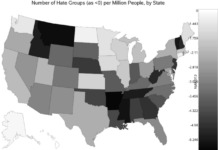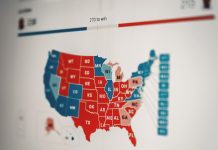Over the weekend, results of a recent poll conducted by the Des Moines Register and Bloomberg Politics showed both Donald Trump and Bernie Sanders – their respective parties’ anti-establishment candidates – surging in the early battleground state of Iowa.
The poll revealed that Sanders, once perceived as a near-impossible dark horse, has closed to within seven points of frontrunner Hillary Clinton, whose numbers have decreased by 20 percent in the state since May, and who held a 19-point lead over Sanders in Iowa as recently as three weeks ago. For Sanders, the positive numbers come two weeks after a separate poll showed the Vermont senator leading Clinton in his neighboring state of New Hampshire.
Trump’s turnaround in Iowa has been even more miraculous. In May, Trump had the support of just four percent of Iowa Republicans, and had a favorability rating of an embarrassing 27 percent. He now leads the field with 23 percent support, with a favorability rating of 61 percent. The favorability rating in particular represents an almost unprecedented turnaround for a figure who, coming into the election, was already widely known – a household name even.
So here we have two out-of-the-mainstream candidates – one too far left for the Democratic establishment, the other seemingly too bombastically bigoted even for the GOP – garnering a level of support that, given the impressive polling numbers, simply must include part of the mainstream electorate.
This begs the question: Are the two phenomena related?
For Republicans, probably not. Both the conservative media and the candidates themselves wholly expect Hillary Clinton to be the Democratic nominee, which is why she continues to be their primary punching bag not named Barack Obama. Naturally, the GOP would be absolutely thrilled if Sanders somehow won the nomination over Clinton, but the number of influential Republicans who believe that scenario is feasible could be counted on one hand, if they exist at all. The point is that, when responding to pollsters, nearly all likely Republicans voters are assuming that the GOP candidate they support would be squaring off against Hillary in the general election. It’s therefore safe to say that Sanders is not impacting the GOP race.
But on the Democratic side of the card, Sanders’ surge may very well be intertwined with Trump’s success. As Trump continues to not only top the Republican field but expand his lead in the weeks following the first GOP debate, Democrats are starting to think that The Donald may very well be The Nominee. From there, it’s easy to envision many Democrats arriving at some variation of the following conclusion:
“Any Democrat would beat that clown.”
In other words, Donald Trump is making Bernie Sanders seem more electable. Many Democrats know full well that, compared to any other GOP candidate with a reasonable chance at winning the nomination – Jeb Bush, Marco Rubio, Scott Walker – Sanders would be seen as an unpalatable socialist in a general election. But compared to Trump… hell, Sanders would be the only sane guy in the room.
It’s Newton’s Third Law, Trump-style: For every action, there is an equal and opposite reaction. Every new poll in which Trump continues to lead the Republican field is a gift for a significant swath of Democrats, ones who would settle on Hillary if they had to… but really don’t want to have to. And for now, The Donald is certainly adding fire to The Bern by making Sanders a mainstream-consumable commodity in a general election match-up that, day by day, becomes less and less hypothetical.
It is well known that primary voters consider candidates’ likely opponents in the ensuing general election. These types of “settle scenarios” were driving factors in the nominations of, for example, Mitt Romney in 2012 and John Kerry in 2004. Neither inspired a passionate following, but both were seen as having the best chances of defeating, respectively, Barack Obama and George W. Bush.
And despite the Sanders surge, Democrats still know full well which of their candidates is the most electable. In a poll conducted just one month ago, Hillary Clinton was deemed most electable by 58% of Democrats to Sanders 17% – a whopping 41% gap.
So Democrats – in Iowa and elsewhere – know that the safest bet to keep the White House lies with Hillary. But here, Trump becomes an X Factor that threatens to render this “settle scenario” – the notion of electability – largely moot.
As hesitant as they might be to pit Sanders against a Bush or a Rubio – this past weekend’s Iowa poll shows Bernie losing badly to both in head-to-head match-ups – Democrats find it hard to believe that any Democrat could lose to The Donald in a general election. Recognizing the abysmal job the media has done thus far in vetting Trump, Democrats think he’d be too exposed during a laser-focused, drawn-out general election campaign to beat nearly anyone, and they are almost certainly correct in this assessment. The same Iowa poll shows a thoroughly unvetted Trump narrowly defeating Sanders in Iowa, an edge that would evaporate and then some once Trump’s surreal media honeymoon ends.
In the here and now, one of the effects of this oddball political landscape has been an even wider chasm between the two parties’ key campaign issues. Republicans have moved even further to the Right, while Sanders is making it increasingly difficult for Hillary to tack to the center in preparation for the general election.
For example, a short while ago it didn’t seem possible that the GOP could move any further to the Right on immigration. Enter Trump, condemning Mexicans as rapists and railing against “anchor babies,” and the GOP’s focus has shifted from how to appeal to vital Hispanic voters to whether or not Mexico should pay for a 1,000-mile wall while we deport 11 million undocumented people at an estimated cost of half a trillion dollars. The crazy just got crazier.
Meanwhile, it’s highly unlikely that Hillary Clinton thought she’d be talking about college affordability – a key Sanders issue – at this point in the Democratic race.
Perhaps the more likely it becomes that Trump will be the nominee, the more dangerous Bernie Sanders will become to Hillary Clinton. And perhaps, for the sake of airing the true differences in opinion not only between the two major parties but also within them, this is all a very good thing.





